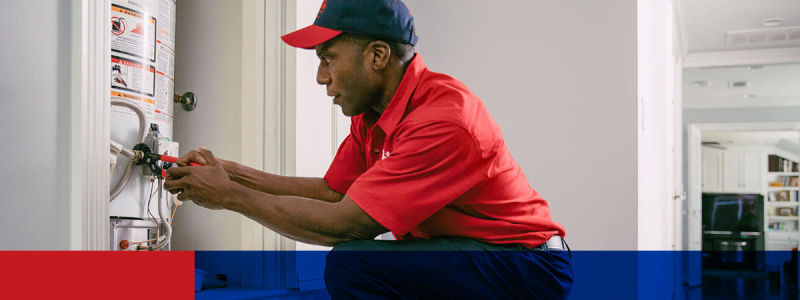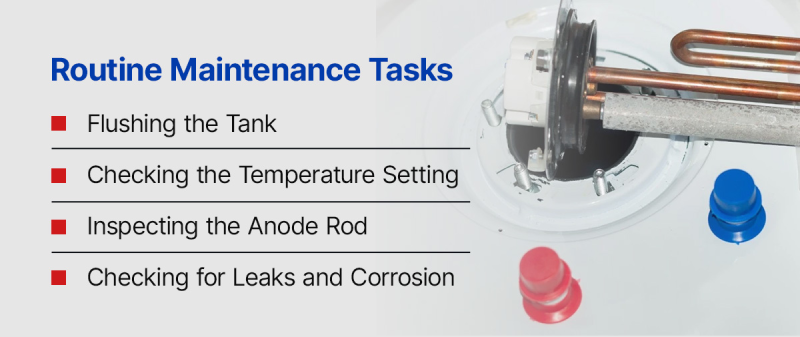
If you want hot water for bathing, cooking and cleaning, you need a reliable water heater system. While water heaters are built to last, they still need regular care. Without maintenance, you could see high utility bills and expensive repairs. Knowing how to extend the life of your water heater in Syracuse can help you avoid cold water troubles.
Signs Your Water Heater Needs Attention
The first step in preventive maintenance on a hot water heater is knowing when your system needs help. Keep your eye out for these warning signs, and call a professional if you notice anything unusual:
- Fluctuating water temperatures
- Strange noises like banging or popping
- Leaks or puddles around the base
- Water discoloration or foul smell
- Increase in energy bills
All of these signs point to something larger going on with your water heater. Whether it is sediment buildup or heater damage, you should contact a professional. The longer you wait, the more the problem can spread, increasing your repair costs.

Routine Water Heater Maintenance Tasks
Investing in regular maintenance is the best way to prevent water heater issues. The more on top of upkeep you are, the earlier you will catch issues and the more reliable your system's performance will be. If you live in Syracuse, New York, water heater maintenance you should complete includes:
1. Flushing the Tank
You should regularly flush your water heater tank if it has one. Over time, sediment collects at the bottom of the tank. This buildup wears down the tank and reduces its efficiency. Flushing removes the buildup, optimizing performance. Flush your tank at least once a year to prevent buildup from causing problems.
To flush the tank:
- Turn off the water heater
- Attach a hose to the drain valve
- Point the hose end at a drainage area
- Open the drain valve to flush the tank
- Close the valve once the water runs clear
- Refill the tank
2. Checking the Temperature Setting
Your water heater has adjustable temperature settings. Keep track of the temperature to ensure there are no unusual fluctuations. Most households should set their water heater at 120 degrees Fahrenheit to prevent scalding and corrosion. Setting your temperature higher means increasing your standby heat waste, driving up energy bills.
You can check and adjust your water temperature by going to the access panel on the water heater. Use a screwdriver to adjust the dial to your preferred setting.
3. Inspecting the Anode Rod
The anode rod is a metal rod in your water tank that keeps the rest of the equipment from corroding. It attracts rust so that the water heater stays rust-free. Check your anode rod every three to five years for wear. Once it looks old, replace it to protect your water heater with these steps:
- Turn off the water heater
- Connect a hose to the drain valve and drain down some of the water
- Use a socket wrench to remove the bolt holding the rod
- Pull out the rod
- Install the new rod and reattach the bolt
- Refill the tank
4. Checking for Leaks and Corrosion
Finally, make sure to check the water heater regularly for leaks and rust. Look around the bottom of the tank and around fixtures for water or mold. If you see leaking water, contact a professional for a thorough water heater inspection near Syracuse. Keep an eye out for rust while you inspect the system. Rust and corrosion mean there might be a hidden leak or part damage. You need a professional to repair or replace the compromised parts.
Preventive Measures
You can take preventive measures to make maintaining your water heater easier. You will reduce wear and tear with some extra upgrades, maximizing heater life.
Installing a Water Softener
Hard water contains high levels of minerals like calcium and magnesium. Over time, these minerals increase sediment buildup, wearing down your water heater, clogging pipes and creating scale deposits. A water softener removes these minerals, protecting the system and improving its efficiency. You will see longer water heater life and better home water quality with less wear and buildup. Talk to a plumbing professional about your water softener options so you can enjoy better water quality and savings.
Insulating the Water Heater and Pipes
Insulating your water system is a great way to decrease utility bills and protect it. Insulation minimizes heat loss, making it easier for your water heater to maintain consistent temperatures. With the system not working so hard, you enjoy lower energy costs and immediate hot water access. Insulating also protects your home from burst or frozen pipes during Syracuse's cold winters.
Insulating your water heater and pipes is simple. Grab a water heater insulating blanket and install it as instructed. To insulate outdoor and indoor pipes, you will need foam sleeves and tape. Wrap exposed pipes and use the tape to secure everything in place.
Common Water Heater Troubleshooting Tips
Even with the best maintenance and preventive measures, water heater issues can still happen. Here are some common issues homeowners might deal with.
No Hot Water
Having no hot water is inconvenient and uncomfortable. Check your thermostat, heating element and gas valve to find the culprit. Electric water heaters might stop producing hot water when the breakers trip or a fuse blows, while gas models might run out of hot water when the pilot light goes out.
You can quickly fix the issue by relighting the pilot light or resetting the thermostat. If you are still out of hot water, you should call a professional.
Water Too Hot
Too-hot water can scald you, drive up heating costs, or overheat the system. To enjoy more comfortable temperatures, adjust your thermostat back to 120 degrees F. If adjusting the thermostat is ineffective, you might need professional repairs or a water heater replacement.
Water Heater Making Noise
Water heaters will make some noise, but you should not hear popping, banging or other loud sounds. These sounds are usually caused by sediment buildup or overheating. Try flushing your tank before looking for component damage. Replace any damaged parts to keep your water heater quiet and efficient.
Extending the Your Water Heater's Life Span
Your water heater can last several years, but it needs excellent care. Follow these tips to maximize its life span:
- Use regular maintenance: Consistency is key. Establish a home and professional maintenance schedule to keep the system working.
- Watch water quality: Hard water will wear out your system faster. To combat buildup, invest in water softeners or flush the tank more frequently.
- Conserve use: Overuse and too-high temperatures can wear out the system faster. Conserve water when you can and monitor the temperature regularly.
- Upgrade when needed: If your water heater is old or inefficient, upgrade it. More energy-efficient models will deliver better performance and higher energy savings.

Call Mr. Rooter Plumbing of Greater Syracuse for Expert Water Heater Plumbers
If you are dealing with water heater issues or need maintenance for your water heater in Syracuse, Mr. Rooter Plumbing of Greater Syracuse is here to help. Our licensed and insured plumbers bring over 50 years of expertise to every job. From repairs to replacements, we deliver unmatched service and customer support. When you work with our team, you get upfront pricing, convenient scheduling and 24/7 emergency service. Request an estimate today!

